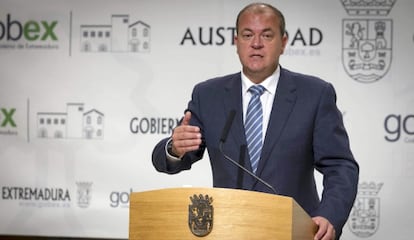Extremadura chief moves to cap mandates for regional premiers
Popular Party’s Monago proposes maximum of two terms

The regional premier of Extremadura, José Antonio Monago of the conservative Popular Party (PP), is ruffling party feathers again by embracing a cause normally associated with the political left.
The Extremadura assembly will be Spain’s first regional chamber to limit the premier’s mandate to two terms in office, according to Monago.
“It is necessary to renew ourselves. The days when politics was a means to make a living are a thing of the past,” the premier said.
But the limit only applies to individuals who have held the post for two consecutive terms, leaving the door open to a future run for office without breaking the law.
The Socialist Party suspects Monago may simply be playing to the crowd, since any government could easily change that rule. The initiative has not gone down well in PP circles, either.
“This is yet another bright idea. The rules of representative democracy say that terms are up to the will of the voters,” says a high-ranking PP official from a different regional government.
Guillermo Fernández Vara, a Socialist leader in Extremadura, believes this might be “fireworks” on the part of the PP to conceal high unemployment levels in the region.
The way it would work from a legal standpoint is also a matter of debate, although the Extremadura executive said the bill would pass this week with support from the regional Consultative Council and the Social Council.
Legal experts consulted by EL PAÍS show a division of opinion between those who fail to see how the two-term limit will be implemented legally, and those who see no problem.
“It would require a reform of the Constitution,” says Roberto Blanco Valdés, a professor of constitutional law at Santiago University. “The limitation of terms is more typical of presidential systems, such as those of the US or certain Latin American countries. In my opinion, it is not a crazy idea in terms of renewing elites, but it could not be applied to high-ranking officials.”
Javier Pérez Royo of Seville University talks along the same lines. He feels the move would at least require a reform of the regional charter.
But María Antonia Trujillo, a former Socialist minister, a former member of the Extremadura government and a professor of constitutional law, sees no problem.
“What Monago intends to do will fill a gap in regional legislation and represent progress in terms of democratic regeneration,” she says.
Emilio Pajares, a professor of constitutional law at Carlos III University, notes that currently only the Catalan charter establishes the option of regulating the premier’s terms in office, although nothing has been done about it yet.
Meanwhile, other politicians have announced similar measures but have met with some skepticism. La Rioja premier Pedro Sanz, for instance, has talked about setting a two-term limit, even though he himself has been in power for four terms.
Tu suscripción se está usando en otro dispositivo
¿Quieres añadir otro usuario a tu suscripción?
Si continúas leyendo en este dispositivo, no se podrá leer en el otro.
FlechaTu suscripción se está usando en otro dispositivo y solo puedes acceder a EL PAÍS desde un dispositivo a la vez.
Si quieres compartir tu cuenta, cambia tu suscripción a la modalidad Premium, así podrás añadir otro usuario. Cada uno accederá con su propia cuenta de email, lo que os permitirá personalizar vuestra experiencia en EL PAÍS.
¿Tienes una suscripción de empresa? Accede aquí para contratar más cuentas.
En el caso de no saber quién está usando tu cuenta, te recomendamos cambiar tu contraseña aquí.
Si decides continuar compartiendo tu cuenta, este mensaje se mostrará en tu dispositivo y en el de la otra persona que está usando tu cuenta de forma indefinida, afectando a tu experiencia de lectura. Puedes consultar aquí los términos y condiciones de la suscripción digital.








































